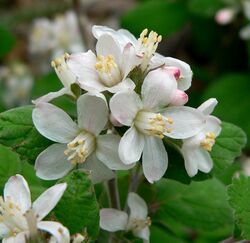Biology:Jamesia
| Jamesia | |
|---|---|

| |
| Jamesia americana in flower | |
| Scientific classification | |
| Kingdom: | Plantae |
| Clade: | Tracheophytes |
| Clade: | Angiosperms |
| Clade: | Eudicots |
| Clade: | Asterids |
| Order: | Cornales |
| Family: | Hydrangeaceae |
| Subfamily: | Jamesioideae |
| Genus: | Jamesia Torr. & A.Gray |
| Type species | |
| Jamesia americana J. Torrey et A. Gray[2] | |
| Species[1] | |
| |
Jamesia is a genus of shrubs in the Hydrangeaceae, most commonly known as Jamesia, cliffbush or waxflower. It is native to interior western North America, in the United States states of Arizona, California , Colorado, Nevada, New Mexico, Utah, and Wyoming, growing in mountains at 1600–3000 m altitude.
Taxonomy
Publication
The genus Jamesia was described by John Torrey and Asa Gray in 1840.[1]
Species
The following species are accepted:[1][3]
- Jamesia americana
- Jamesia tetrapetala
Description
It is a shrub growing to 1–2 m tall and to 3 m or more broad, with opposite simple leaves 3–7 cm long and 2–5 cm broad, with a serrated margin and a crinkled surface. The flowers are produced in erect terminal panicles, each flower white, 15–20 mm diameter, with five (rarely four) petals. The fruit is a dry capsule with numerous small seeds.
Etymology
The genus is named in honor of Edwin James, the botanist on Stephen Long's expedition in 1820 that explored the territory between the Platte and Arkansas Rivers. James was the first to collect this genus for botanical study.[4]
Notes
- ↑ 1.0 1.1 1.2 "Jamesia Torr. & A.Gray" (in en). Royal Botanic Gardens, Kew. http://www.plantsoftheworldonline.org/taxon/328793-2. Retrieved 5 January 2024.
- ↑ Jamesia | International Plant Names Index. (n.d.). Retrieved January 6, 2024, from https://www.ipni.org/n/328793-2
- ↑ Holmgren & Holmgren (1989)
- ↑ Fertig, USDA
References
- Fertig, Walter. "Cliff Jamesia (Jamesia americana)". USDA Forest Service. https://www.fs.fed.us/wildflowers/plant-of-the-week/jamesia_americana.shtml.
- Holmgren, Noel H.; Holmgren, Patricia K. (1989). "A Taxonomic Study of Jamesia (Hydrangeaceae)". Brittonia 41 (4): 335–350. doi:10.2307/2807545.
- "Jamesia". 2013. http://www.theplantlist.org/1.1/browse/A/Hydrangeaceae/Jamesia/.
External links
| Wikimedia Commons has media related to Jamesia. |
Wikidata ☰ Q144428 entry
 |
